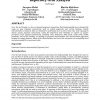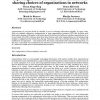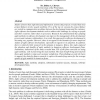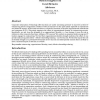AMCIS
2015
Springer
9 years 10 months ago
2015
Springer
Since the proliferation of technologies in organizations has been found to lead to technostress in employees and to various negative organizational consequences, much recent resea...
AMCIS
2015
Springer
9 years 10 months ago
2015
Springer
Standards in general promise more efficiency and effectiveness in doing (electronic) business. Lowering the costs of collaboration, achieving these gains depends of the developmen...
105
click to vote
AMCIS
2015
Springer
9 years 10 months ago
2015
Springer
The role of ICT is becoming prominent in tackling some of the urban societal challenges such as energy wastage and increasing carbon emissions. In this context, the concept of DAR...
AMCIS
2015
Springer
9 years 10 months ago
2015
Springer
Over the last decade, we have witnessed payment innovations that fundamentally have changed the ways we pay. Payment innovations, such as mobile payments and on-line banking, incl...
102
click to vote
AMCIS
2015
Springer
9 years 10 months ago
2015
Springer
Although science has become an increasingly collaborative endeavor over the last hundred years, only little attention has been devoted to supporting scientific communities. Our wo...
AMCIS
2015
Springer
9 years 10 months ago
2015
Springer
Organizations do not just decide on whether or not to exchange information digitally. In many cases, there are multiple alternative configurations of inter-organizational systems ...
AMCIS
2015
Springer
9 years 10 months ago
2015
Springer
In an interorganizational relationships (IOR) context, interorganizational information systems (IOS) need to be integrated in order to support collaboration between partners and p...
169
click to vote
AMCIS
2015
Springer
9 years 10 months ago
2015
Springer
Studies of more than eight thousand information systems (IS) projects revealed that most project failures involve people problems. Five of the top six reasons for project failure ...
AMCIS
2015
Springer
9 years 10 months ago
2015
Springer
Corporate Information Technology (IT) functions are under increasing pressure to succeed in their IT outsourcing (ITO) arrangements. Studies of ITO success have in the past mainly...





